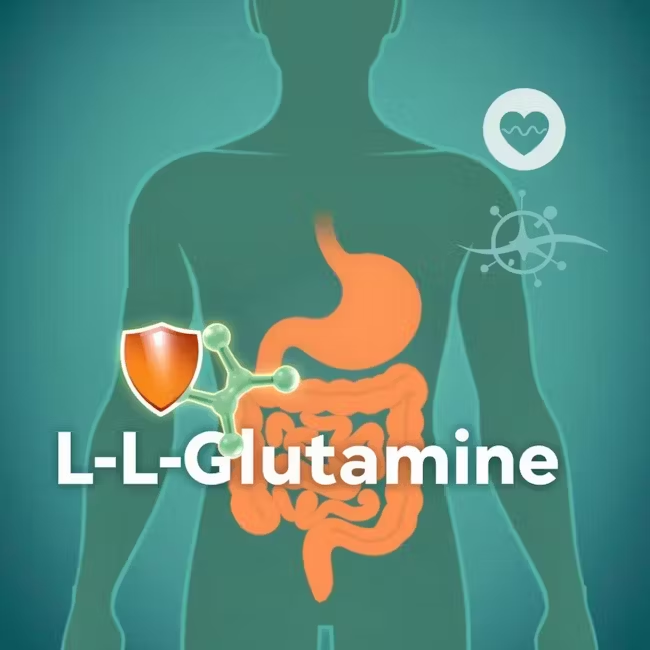When it comes to maintaining a healthy digestive system, there’s one vital amino acid that plays a starring role: L Glutamine. Gut health is closely linked to our overall well-being, and L Glutamine is an essential nutrient that supports it. As the most abundant free amino acid in the body, L Glutamine is involved in many processes that keep our gut functioning properly. But what exactly is L Glutamine, and how does it impact our digestive health? In this article, we’ll delve into the world of L Glutamine, exploring its importance, functions, and benefits, as well as how you can incorporate it into your diet to support a healthy gut.
1. Introduction to L Glutamine: Unlocking the Power of a Vital Amino Acid
L Glutamine is one of the most abundant amino acids found in the human body. It is a conditionally essential amino acid, meaning that under normal circumstances, the body can synthesize enough of it to meet its needs. However, during times of stress, injury, or illness, the body may not be able to produce enough L Glutamine, making supplementation necessary.
For many years, L Glutamine has been used as a supplement to support muscle growth and recovery in athletes and bodybuilders. However, its benefits extend far beyond the realm of sports nutrition. L Glutamine plays a crucial role in maintaining the health of the gut, brain, and immune system.
As a fuel source for the gut lining, L Glutamine helps to maintain the integrity of the gut epithelial cells. This is especially important for people who suffer from leaky gut syndrome, a condition where the gut lining becomes permeable, allowing toxins and undigested food particles to pass through the gut wall and into the bloodstream.
Research has shown that L Glutamine supplementation can help to improve gut health by increasing the expression of tight junction proteins, which are essential for maintaining the integrity of the gut lining. Additionally, L Glutamine has been shown to have anti-inflammatory properties, which can help to reduce inflammation in the gut and improve overall digestive health.
By understanding the importance of L Glutamine in maintaining gut health, we can unlock its full potential and harness its power to promote overall well-being. In the following sections, we will delve deeper into the benefits of L Glutamine and explore its role in supporting digestive health and immune function.
2. What is L Glutamine and Why is it Important for Gut Health?
L-glutamine is a conditionally essential amino acid, meaning that under normal circumstances, the human body can synthesize it on its own. However, during times of stress, illness, or injury, the body may not be able to produce enough L-glutamine to meet its needs, making supplementation necessary.
In the context of gut health, L-glutamine plays a vital role in maintaining the integrity of the gut lining. The gut lining is a delicate barrier that separates the digestive tract from the rest of the body, and it’s essential for absorbing nutrients and preventing toxins from entering the bloodstream. L-glutamine is a primary source of fuel for the cells that line the gut, known as enterocytes.
Research has shown that L-glutamine can help to repair and heal the gut lining, reducing inflammation and improving the overall health of the gut. This is especially important for individuals with gastrointestinal disorders such as leaky gut syndrome, irritable bowel syndrome (IBS), and inflammatory bowel disease (IBD).
In addition to its role in maintaining gut health, L-glutamine has also been shown to have immunomodulatory effects, meaning that it can help to regulate the immune system and prevent illness. This is especially important for individuals who are at risk of developing infections or illnesses due to a compromised immune system.
Overall, L-glutamine is an important amino acid that plays a critical role in maintaining the health of the gut. By supplementing with L-glutamine, individuals can help to support the health of their gut and prevent a range of gastrointestinal disorders.
3. The Role of L Glutamine in Gut Health: Gut-Associated Lymphoid Tissue (GALT)
L Glutamine plays a vital role in maintaining the integrity of the gut lining and supporting the function of the Gut-Associated Lymphoid Tissue (GALT). GALT is a complex network of immune cells and lymphoid tissues that line the gut, and it is responsible for protecting the body against pathogens and toxins that enter through the digestive system.
One of the key ways that L Glutamine supports GALT is by providing energy and nutrients to the cells that make up the gut lining. The epithelial cells that line the gut wall have high energy requirements, and L Glutamine serves as a primary source of energy for these cells. This is especially important in times of stress or injury, when the gut lining may be compromised and in need of additional support.
L Glutamine also helps to maintain the integrity of the gut lining by promoting the expression of tight junction proteins. Tight junction proteins are critical for maintaining the barrier function of the gut lining, and they help to prevent the passage of toxins and undigested food particles into the bloodstream. By supporting the expression of these proteins, L Glutamine helps to prevent leaky gut syndrome and other digestive disorders.
Furthermore, L Glutamine has been shown to have anti-inflammatory effects in the gut, which can help to reduce inflammation and promote healing in the gut lining. By reducing inflammation and promoting healing, L Glutamine can help to support the function of GALT and protect against infections and diseases.
4. How L Glutamine Supports Digestive Health: From Gut Motility to Immune Function
L Glutamine plays a vital role in supporting digestive health, and its benefits extend beyond just reducing inflammation. One of the key ways L Glutamine supports digestive health is by promoting gut motility, which is the movement of food through the digestive system. This is especially important for individuals who experience digestive issues such as irritable bowel syndrome (IBS), where gut motility can be impaired.
Research has shown that L Glutamine supplementation can help to improve gut motility, reducing the symptoms of IBS and other digestive disorders. Additionally, L Glutamine has been shown to enhance the barrier function of the gut, reducing the permeability of the gut lining and preventing toxins and undigested food particles from passing through into the bloodstream.
L Glutamine also has a profound impact on immune function in the gut. The gut-associated lymphoid tissue (GALT) is responsible for producing immune cells that help to fight off pathogens and other foreign invaders. L Glutamine has been shown to support the growth and function of GALT, enhancing immune function and reducing the risk of infection and disease.
Furthermore, L Glutamine has been shown to reduce inflammation in the gut, which is a major contributor to digestive disorders. By reducing inflammation and promoting healing, L Glutamine can help to restore the health of the gut and prevent digestive problems from arising.
Overall, L Glutamine plays a critical role in supporting digestive health, from promoting gut motility to supporting immune function and reducing inflammation. By incorporating L Glutamine into your diet, you can help to maintain a healthy gut and prevent digestive problems from occurring.
5. The Impact of L Glutamine on Immune Function and Inflammation
L-Glutamine has been shown to have a significant impact on immune function and inflammation in the body. As a vital amino acid, it plays a crucial role in maintaining the health of immune cells, such as macrophages and T-cells. Research has found that L-Glutamine supplementation can enhance the function of these cells, leading to a stronger immune response.
One of the primary ways in which L-Glutamine supports immune function is by regulating the production of cytokines, which are signaling molecules that help to coordinate the immune response. By regulating cytokine production, L-Glutamine can help to prevent excessive inflammation, which can damage tissues and lead to chronic diseases.
In addition to its effects on cytokine production, L-Glutamine has also been shown to support the health of the gut-associated lymphoid tissue (GALT), which is a critical component of the immune system. The GALT is responsible for filtering out pathogens and toxins from the gut, and L-Glutamine helps to maintain its function, even in the face of stress or disease.
Furthermore, L-Glutamine has been found to have anti-inflammatory effects, which can help to reduce the severity of conditions such as irritable bowel syndrome (IBS) and inflammatory bowel disease (IBD). By reducing inflammation, L-Glutamine can help to promote healing and improve overall gut health.
In summary, the impact of L-Glutamine on immune function and inflammation is multifaceted and far-reaching. By supporting the health of immune cells, regulating cytokine production, maintaining GALT function, and reducing inflammation, L-Glutamine plays a critical role in maintaining a healthy immune system.
6. Current Research and Findings on the Benefits of L Glutamine Supplementation
Various studies have been conducted to explore the benefits of L Glutamine supplementation on gut health and overall well-being. Research has shown that L Glutamine supplements can be beneficial for individuals with gastrointestinal disorders, such as irritable bowel syndrome (IBS), inflammatory bowel disease (IBD), and celiac disease. These conditions often result in inflammation and damage to the gut lining, which can lead to malabsorption of nutrients and impaired immune function.
One study published in the Journal of Parenteral and Enteral Nutrition found that L Glutamine supplementation reduced inflammation and improved gut barrier function in patients with IBD. Another study published in the Journal of Clinical Gastroenterology found that L Glutamine supplementation improved symptoms and quality of life in patients with IBS. These findings suggest that L Glutamine supplementation may be a useful adjunct therapy for individuals with gastrointestinal disorders.
Additionally, research has also explored the benefits of L Glutamine supplementation on exercise performance and recovery. A study published in the Journal of Strength and Conditioning Research found that L Glutamine supplementation reduced muscle soreness and improved recovery after intense exercise. This suggests that L Glutamine supplementation may be beneficial for athletes or individuals who engage in regular physical activity.
Overall, the current research suggests that L Glutamine supplementation may have a range of benefits for gut health and overall well-being, including reducing inflammation, improving gut barrier function, and supporting exercise performance and recovery. However, more research is needed to fully understand the effects of L Glutamine supplementation in different populations and to determine optimal dosing and duration of treatment.
7. Incorporating L Glutamine into Your Diet: From Foods to Supplements to Better Gut Health
Now that we’ve explored the benefits of L-glutamine for gut health, let’s dive into how you can incorporate this essential amino acid into your diet. There are two primary ways to do this: through food and supplements.
Natural Food Sources of L-glutamine include lean meats, fish, eggs, dairy products, and plant-based options like beans, lentils, and vegetables. Some of the richest sources of L-glutamine are:
- Chicken breast (3.5 grams per 3-ounce serving)
- Salmon (3.2 grams per 3-ounce serving)
- Turkey breast (3.1 grams per 3-ounce serving)
- Beef (2.9 grams per 3-ounce serving)
- Black beans (2.8 grams per 1 cup cooked)
While it’s possible to get enough L-glutamine through your diet, supplements can be beneficial for those with digestive issues or compromised gut health. When choosing an L-glutamine supplement, look for a product that is:
- Free from common allergens and additives
- Manufactured by a reputable brand
- Available in a form that suits your needs (capsules, powder, or tablets)
When incorporating L-glutamine into your diet, it’s essential to start with a low dose (around 500-1000 mg) and gradually increase as needed. This allows your body to adjust and reduces the risk of adverse effects. Always consult with a healthcare professional before adding any new supplements to your regimen.

